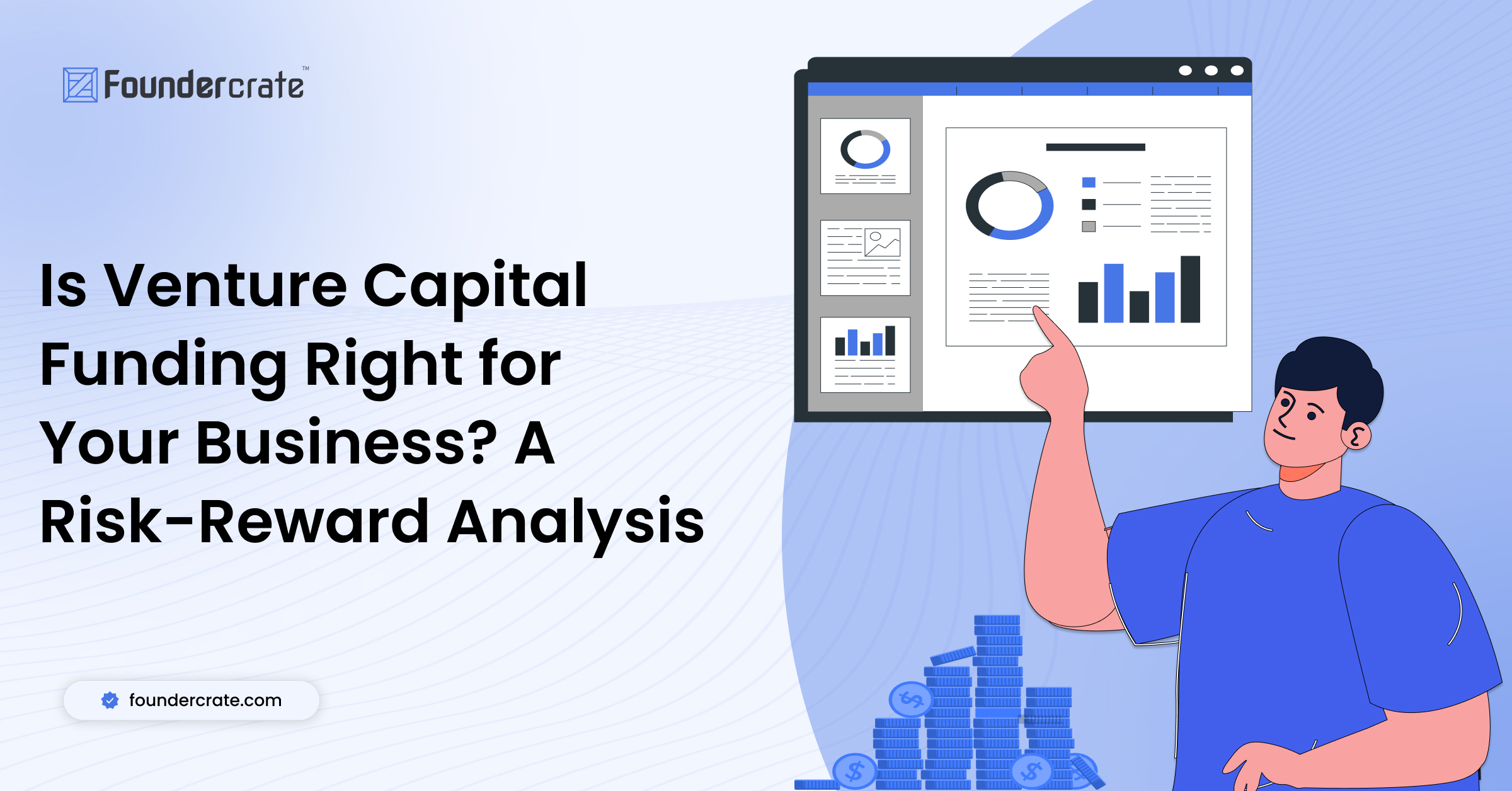Is Venture Capital Funding Right for Your Business? A Risk-Reward Analysis

Starting a startup requires a ton of cash. One way for startup owners to get funding is from venture capital investors. Venture capitalists can provide the money you need to launch and expand a business.
Startup owners should proceed carefully if accepting money from venture capital. Let’s weigh the risks and rewards of VC funding, so you can decide what’s best for your business.
Risks of Venture Capital Funding
There are a number of risks associated with venture capital funding, including:
Loss of control
You lose power when you take money from VC investors. VC means venture capitalists. These people give money to start new companies.
When a new company takes VC money, the investors want to sit on the company board. A board makes big decisions for a company.
Having seats on the board gives venture capitalists a significant say in how the company is managed and operates. The founders may find that they have less control over shaping how the company works going forward.
This is a problem that new companies can face when they take VC money.
High-interest rates
Venture capital loans often charge very high interest. This can make it hard for startups to pay back the loans, especially if the new business does not do well.
High interest means startups must pay a lot in interest payments along with the main amount they borrowed. This takes money away from the business right from the start. It becomes a big problem, leaving little room for mistakes in a business that is just beginning and already faces many risks.
So business owners need to understand these loans well. They need to know that high interest will make it much harder for the business to make a profit.
Dilution of ownership
When a startup gets venture capital money, the venture capitalists usually buy part of the company in exchange. This means the founders and employees end up owning a smaller part of the startup.
In simple terms, the pie that represents owning the company gets divided into more pieces. So even though your slice of pie is still the same size, there are now more people who also have a slice. This lessens how much of the company you actually own compared to before venture funding.
So venture capital cash comes with a cost- the dilution of ownership for the startup’s founders and early employees.
Performance expectations
Venture capitalists want startups to grow fast and be worth a lot. This means startups and the people that run them feel a lot of pressure.
Startups have to work hard to meet these goals. The stress can wear founders and employees out. It can make them tired all the time. Working like this for a long time hurts people.
Startups need to be careful. They must take care of the people that run the business. Growing a company takes time. Don’t let investors push so hard it hurts your health and your business.
Exit strategy
Venture capitalists usually want their money out of startups within a few years. This means startups feel pressure to “exit” – like being acquired or going public – in a short time.
This limited time horizon can be tough on startups. It means scaling and exiting fast instead of focusing on the long run.
Startups have to set short-term goals to please their investors. But rushing an exit strategy might not be best for the company’s health in the long run. Venture capitalists want a quick return, but startups need to think about building something that lasts.
Rewards of Venture Capital Funding
Despite the risks, there are also a number of rewards associated with venture capital funding, including:
Access to Capital
Venture capitalists provide money that lets startups expand their operations and hire more employees.
This money can help them compete better against other companies that are also trying to grow. Venture funding helps startups move faster and access resources they otherwise could not afford in the early stages.
The cash infusion can be a real advantage for startups that need money to turn their ideas into reality.
Expertise and guidance
Venture capitalists often have a lot of experience starting and growing companies. They can provide valuable advice and guidance to the startups they invest in.
These experienced businesspeople can give suggestions on strategy, hiring, marketing, and other aspects of growing a company. Their feedback and expertise can help fledgling startups avoid costly mistakes and navigate the challenges of building a business.
A good VC can act like an extra member of a startup’s advisory board, offering advice when needed. The guidance from venture capitalists can supplement what the startup founders know on their own.
Networking opportunities
Venture capitalists tend to have extensive contacts in the business community. This provides startups with access to their VC network.
Venture firms can introduce startups to potential customers, partners, suppliers, and other companies that may be a good fit. They can also connect startups to potential hires and advisors. Having a VC backer opens doors and provides opportunities to tap into their vast network of business connections.
The bigger the venture firm and the more portfolio companies they have funded, the larger their network typically is. Venture funding gives startups an “in” with people and companies they may not otherwise have access to in the early stages.
Increased brand awareness
Receiving venture capital funding often leads to media coverage and publicity for a startup. News outlets report on which companies secured funding, for how much, and from which VC firms. This media attention can help spread the word about the startup’s brand and product.
Increased awareness through the publicity that comes with VC funding can help startups attract new customers, partners, and talent. More people learn about the startup and what it offers just from it being publicly announced that a venture capitalist invested.
The upside is more visibility for an early-stage company, while the downside is that competitors also learn more about the startup.
Faster growth
Venture capital funding provides startups with the resources needed to expand operations at a rapid pace. They can hire more quickly, develop products faster, and enter new markets sooner compared to being self-funded.
The infusion of cash gives startups the ability to scale up in a hurry. This accelerated growth can allow startups to establish a foothold in their market and gain an edge over later entrants.
So venture funding can help startups scale up quickly enough to seize opportunities and establish themselves before competitors catch up.
Also Read:- How venture capital investing works: A Complete Guide
Conclusion
To sum it up, venture capital funding can give startups the money, connections, and visibility they need to expand and grow quickly. But it’s not without its risks – startups may lose control, face high-interest rates, have their ownership diluted, and be under pressure to meet performance expectations and exit. So startups should think carefully about whether venture capital funding is the right choice for them.
Related Posts

How to Improve Investor Communication
In the startup world, strong communication with investors is critical for success. Transparent, timely, and strategic communication helps build trust and maintain long-term investor relationships. However, managing investor updates and keeping them informed can often…

Why Financial Metrics are Important Numbers for Success
Introduction In the business world, financial metrics are like maps that show the way for making decisions and plans. They give us helpful clues about how well a company is doing, so we can make…
Recent Comments
Categories
- Analytics And Insights
- Business
- Community Management
- Compliance
- Customer Success
- Entrepreneur
- Financial Management
- Fundraising Strategy
- Fundraising Tips
- Growth Strategy
- Investor Relations
- Legal Management
- Market Analysis
- Market Trends
- Marketing Strategy
- Product Development
- Product Insights
- Sales Strategy
- Security And Compliance
- Stakeholder Management
- Team Building
- Team Collaboration
- Team Management
- Tech And Innovation
- Uncategorized
Want to get more content like this?
Signup to directly get this type of content to your inbox!!




